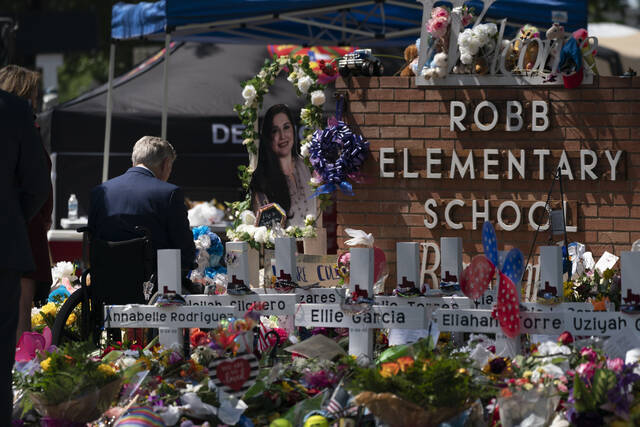When I glanced at my phone and saw the notification of a school shooting in Uvalde, Texas, my hands started to shake and I turned my phone off for a few hours.
I was one of many children impacted by a school shooting when I was the age of the victims in Uvalde, and now I have children the same age I was when a shooter burst into an elementary school in my hometown of Winnetka, Ill., on a beautiful May day in 1988.
I was not in that classroom and was not shot or physically injured. But the trauma remains.
On that day decades ago, I was in my classroom and suddenly my teacher received a phone call. Our classroom had two walls of windows facing the woods — across which was the classroom where the shooting occurred. My teacher, Mrs. Beckwith, stood up and told us to get under our desks immediately, then went to the windows trying to find curtains to close. She locked the door to the hallway and to the courtyard. Tears streaming down her face, she told us to be quiet.
“There’s a fire or something. Stay quiet and under your desks.”
I knew — we all did — that it wasn’t a fire. Why would our teacher be crying? Why would we stay under our desks?
Some time passed. I don’t know how long. I remember asking if I could use the bathroom. I really had to pee. I was told no one could go to the restroom, get water or anything. Soon it was lunchtime, and we asked if we could eat. No, we had to stay quiet until she let us know.
This was no ordinary fire drill.
It was about then that we heard several helicopters and a commotion in the woods. Our classroom was L-shaped, and at that point I remember being moved with my classmates to the short end of the L, away from the windows and woods.
There were a few phone calls, tears, waiting. Soon it was time for dismissal, but we weren’t going to be dismissed. I asked why, and Mrs Beckwith said, “We have to wait for your parents. We have to wait until it is safe.”
Later — how much longer is fuzzy — we were dismissed one by one as parents arrived. My mother burst into tears when she saw me and my brother. We walked outside and saw TV cameras, reporters, police, people dressed in black body armor. I asked my mother what was happening, and — jogging away — she said she would tell us when we got home.
That was when we found out a shooter had entered a second grade classroom and shot five children, one fatally, before she ran off through the woods to a house where she shot the homeowners before ultimately killing herself. The boy who died — Nick Corwin — was a friend of my brother. They played basketball together.
I want to be clear that I was lucky here — not even a victim in any direct sense. Yet the paralyzing fear, the vivid memories, the trauma come flooding back every time there is a school shooting.
I know it is not just me. Several friends from childhood have reached out or checked in because they feel the same. The trauma of it does not go away, even if you are a lucky one. It sticks with you, sometimes surfacing just as fresh and immediate as it was that day. There are ripple effects to this kind of callousness around human life — especially the lives of children.
And now I’m a parent of children the same age who could very well be victims of the next school shooting. Except that today, instead of handguns, school shootings are carried out by assault-style weapons. Had the shooter charged into our community school now, I am sure there would have been many more children injured or killed.
This is where the residue of such a trauma, the frustration that nothing has changed, comes at me unexpectedly.
When I send my children off to school — two in elementary school, one in middle school, roughly the same ages as the children in Uvalde and one close to my age when I hid under my desk hungry and needing to pee — I don’t wonder if it could happen to them. I know it could because it happened to me, to my community.
My children are the second generation that need to fear the trauma of a school shooting, one of a growing number of children who have had first- or second-hand experience of a horrific event that now seems familiar if not almost routine.
How can nothing have changed?








